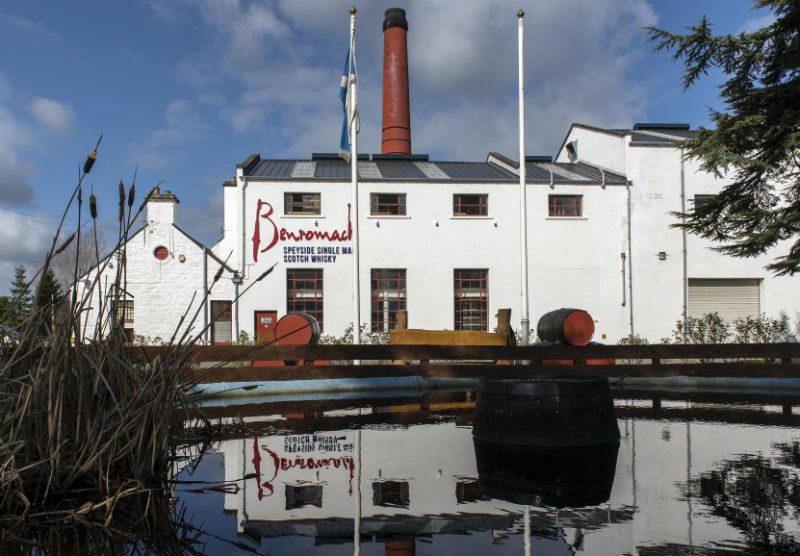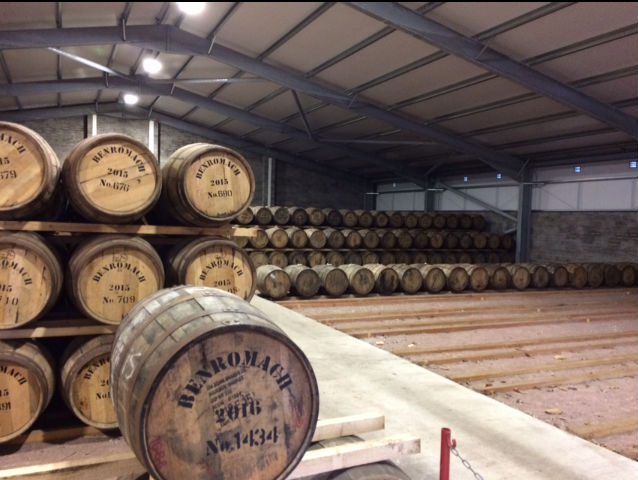From the outside, the process of whisky making can seem like magic; with water, barley and yeast going in and Scotland’s most popular export coming out (after an extended stay in oak casks of course), with little external indication of what actually goes on in between - outwith the glimpses occasionally revealed by promotional videos, tours and visitor centre diagrams.
But, pull back the curtain on this wizardry, and you’ll find there is a distiller or two frantically pulling levers, turning wheels and pushing the whole process along to create the magic.
Speyside is is home to Scotland’s biggest concentration of whisky distilleries and it’s here you’ll find a massive array of production sites, ranging from global spanning behemoths like Glenfiddich and Macallan to smaller more traditional distilleries like Benromach.
Located close to the Romach hills and situated in the picturesque town of Forres, Benromach distillery uses much of the same processes it did when it was first founded in 1898, with the automation in so many modern distilleries conspicuously absent.

Picture: Benromach Distillery
Apart from a 60s style control board filled with gauges for temperature control and buttons for organising the flow of water from the various holding tanks to the Mash Tun, everything is still done by hand, with the distillers turning an array of wheels and flipping a multitude of switches manually.
Run by a small dedicated team, the Benromach stillhouse is a relatively serene hive of activity, with one shift worker overseen by Keith and assistant distillery manager Jessica Haworth - who provide the perfect blend of experience and academic knowledge.
Keith, a veteran within the industry, explained that it is important to both the staff and the management that the distillery continues to handcraft their single malt whisky in the time-honoured tradition, adding that it means his team are able to closely manage “every second of the distillation process” and to ensure “no short cuts are taken".
Keith stated that this ethos is also carried through to the maturation process, stating: “Every cask is hand-filled, hand-weighed and hand-stamped by us before maturing for many years in our traditional dunnage warehouses."

Benromach casks maturing in the distillery's traditional dunnage warehouses. Picture: Sean Murphy
New recruit Murdo MacKenzie, who joined the distillery team in summer 2016, is already confidently running shifts in the distillery’s compact stillhouse.
A local man - hailing from nearby Findhorn - the young distiller applied for the job internally after he learned the distillery was upping production to meet global demand, while he was working in his role in the warehouses at Benromach’s owners, the Elgin based Gordon and MacPhail (who bought and revitalised the Forres distillery in 1993).

New distiller Murdo checking the washbacks. Picture: Sean Murphy
At the beginning, Murdo found the training for the role intense. He said: “At first, it was like spinning plates, I had one job here and one job there, but now I enjoy it and it’s become second nature. I really enjoy my entire job, but some of the most enjoyable parts are taking the mash down, filling casks and taking the spirit cut by hand."
While on shift he’s responsible for helping to produce no less than four different spirit runs over the calendar year – classic, peated, organic (a world-first when it was launched) and triple distilled – with the mashing, fermentation, distillation and even the milling all falling under his remit.
Navigating by sound, touch and smell as much as by the gauges and log books, Murdo never really seems to stop moving; starting at the mash tun then checking the spirit safe and stills before heading through to the washbacks – which are housed in a separate room – and even checking in on the boiler, which Murdo describes as the most important component in the whole process, as, if something goes wrong with it, “everything stops”.
The hardest part, he says, while hosing down the mash tun for the next intake, is remembering all of the processes and when they need to be completed. He said: “There are a lot of things that need to be done around the same time, so getting into a routine was very important. My job is quite unique in the whisky industry today as Benromach is completely handcrafted.”
He admits it’s hard graft, with shifts starting at 6am and the three distillers rotating the three main shift patterns over a 24 hour period, but he is quick to add that being part of a close-knit team is a big help and that when he sees the finished product he feels all of the hard work is worth it.
“It is great to see our whisky going out across the world though, and it’ll be even better when the whisky I’ve made is eventually bottled!”
This year is a landmark one for the Speyside site, with its 20th anniversary of distilling arriving on the back of a successful launch of its newest whisky, the Triple Distilled - where the Benromach spirit is distilled in a wash still once and twice in the spirit still, before its matured in first fill bourbon barrels - which Keith describes as a “light golden malt with light, sweet vanilla, chocolate and lemon notes and a lingering smokiness”.
The experienced whisky maker added that, along with the distillery itself turning 120 years old, this year also marks 20 years of distilling under Gordon & McPhail ownership and 25 years since the Urquhart family bought the distillery.
He said: “These milestones will be celebrated throughout the year with a focus on hosting the opening gala dinner at the Spirit of Speyside Whisky Festival in May.”
